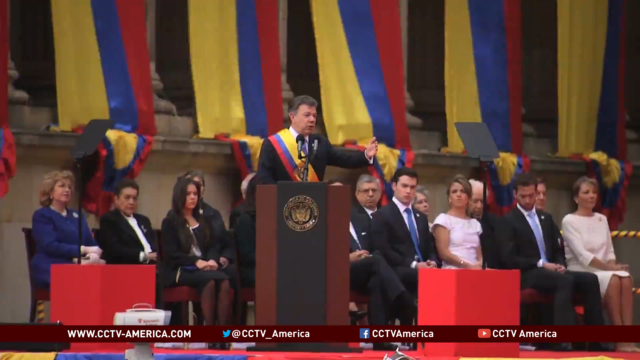Colombia’s peace talks are underway with the intent of ending 50 years of armed conflict. The talks have entered a critical phase where negotiators are not only addressing the issue of victim reparations, but also what punishment the rebel group, FARC, will face for its crimes. Human Rights organizations and opposition groups to the peace talks have expressed fears that the FARC will receive amnesty for their crimes. CCTV America’s Michelle Begue reported on Colombia’s attempt at transnational justice.

Nidia Sanchez was a councilwoman from Colombia’s Arauca region. In early 2000, the leftist guerrilla group FARC, which stands for Revolutionary Armed Forces of Colombia in Spanish, kidnapped her and held her hostage for 15 days. During the ordeal, the FARC commander sexually assaulted her repeatedly.
“My children don’t know this yet,” said Sanchez. “I haven’t wanted to tell them anything, because I don’t want them to feel the hate, like the hate I have in my heart.”
In Colombia, a person found guilty of rape can serve anywhere from 12-20 years in prison. However, current peace negotiations with the FARC may make it so that crimes like the one against Sanchez may go unpunished. In a final deal, the rebel group may be offered shorter sentences in exchange for laying down their weapons.
In August, Colombian President Juan Manuel Santos alluded to the thorny issue of justice in the event that a peace agreement is signed.
“The justice that will result from this process, will not be a perfect justice, No.” Santos said. “But it will have to be an honest justice. A justice that assures maximum satisfaction for the victims.”
The specifics are still not clear. In 2012, lawmakers passed the “Legal Framework for Peace” that laid down a foundation for a future transitional justice system.
“The transitional justice system was invented in Latin America after the dictatorships in the Southern Cone [Argentina and Chile],” said Ernesto Borda Medina, a political analyst. “The reality is that you sacrifice a certain amount of justice in order to transition to peace and democracy.”
Colombia’s first experience with a transitional justice was through the 2005 Justice and Peace Law. The purpose was to facilitate the demobilization of right-wing paramilitaries, who wanted to give up fighting and were willing to confess their crimes in exchange for shorter jail sentences.
Of the 30,000 fighters that turned in their weapons, 90 percent received amnesty, and the remaining 10 percent were given five- to eight-year sentences if they promised to lay down arms, confess the truth, and compensate victims.
Human rights lawyers criticize the law for not doing enough to assure reparations.
“Our opposition is not because we are stubborn, or because we want to torpedo the process of reconciliation and justice and peace,” said Juan David Ortega Jimenez, a lawyer for Victims of Paramilitaries. “We are saying there has been non-fulfillment of what was promised and we can’t award that.”
As Colombian citizens continue to grapple with the results of the Justice and Peace Law, Colombian officials are looking at the peace process with the FARC and trying to determine how to effectively prosecute crimes against humanity without endangering a final agreement.
“We have to make Colombian society understand, that it doesn’t matter if these guerrillas are good or bad, if they are deserving or not of peace,” said Medina. “What is fundamental is to understand that only a peace agreement is going to permit that we close those vulnerabilities that allow for this violence to reproduce. So, this process needs to be seen more in favor of the people that are excluded from development because of the war, than as a favorable process for the guerrilla.”
The FARC has said they have not agreed to any type of transitional justice and they have only negotiated the right to run for political office if they demobilize and reintegrate into civilian life. This position by the rebel group has been highly criticized. However, Carlos Villamil Ruiz, the Director of Transitional Justice in the Attorney General’s office said Colombians need to take understand the bigger picture.
“I think we need to ask ourselves what generates more fear, having participants of the armed conflict continuing to generate violence, kidnapping and threats, or participants of the armed conflict, unarmed sitting in front of the judges and magistrates and authorities, telling the truth without a weapon and with the expectation of reincorporating themselves into civilian life,” said Ruiz.
For Nidia Sanchez, the wounds of the armed conflict still haven’t healed, but the prospect of peace is something to look forward to.
“As for a peace process, we want it to happen soon. The victims need this to end,” said Sanchez. “We cannot wait our whole lives for [peace], and having those men in jail will not solve all of our economic and social problems.”
The process of getting to a peace agreement can take years, and it isn’t just about criminal trials. Sometimes reparations are paid to help victims recover from trauma. CCTV America interviewed Marcie Mersky, director of programs at the International Center for Transitional Justice to learn how people can overcome traumatic histories.

 CGTN America
CGTN America

